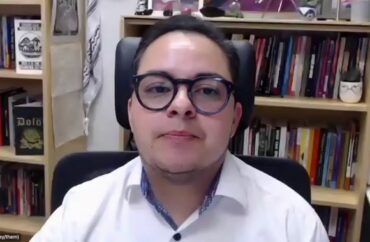
Faculty condemn Trump administration’s ‘anti-intellectualism,’ advocate for ‘collective’ property
“Colonial dysphoria” causes “distress” for “marginalized” students while “anti-intellectualism” fueled by President Donald Trump’s administration suppresses dissent, a University of Utah professor said during a Tuesday webinar.
Also during the feminism webinar, two Ghent University faculty members challenged capitalist property norms and condemned Israel’s pronatalist policies for excluding Palestinians.
The event, hosted by the University of California, Berkeley, was titled “Bridging Decolonial Feminist and Queer Theory, and Materialist Feminist Theory.”
University of Utah Professor Omi Salas-SantaCruz defined “colonial dysphoria” as “the profound dislocation and distress experienced by marginalized individuals, particularly minoritized populations due to colonial legacies that shape identities and experiences within colonial universities.”
The transgender-identifying professor criticized universities for maintaining “deep power imbalances and colonial attitudes” despite superficial diversity efforts.
Students from diverse backgrounds feel out of place because the courses don’t reflect their experiences, and they’re “exhausted” from having to explain who they are and their histories to others, Salas-SantaCruz said.
Further exacerbating “colonial dysphoria” is “anti-intellectualism” and what the scholar called the “war on woke.”
“Anti-intellectualism is a growing force undermining academic life, characterized by skepticism toward experts or in a preference for a ‘common sense’ over research,” the professor said.
“This train kind of gained momentum during the first Trump administration in the United States, where disdain for intellectuals and the promotion of ‘alternative facts’ emerged within the political discourse,” Salas-SantaCruz said.
Salas-SantaCruz also said surveys in the U.S. show that people who distrust experts “are most likely to support right-wing leaders.”
“This sentiment has led to a backlash against academic fields like critical race theory in the United States, gender studies, which has been distorted and banned in several states, but also reflects a broader rejection of nuanced scholarship in favor of comforting narratives for populations in power,” the professor said.
This “war on woke” involves an “Orwellian inversion” as “those fighting racism are called racist, and those promoting inclusion are labeled as intolerant,” Salas-SantaCruz said.
“It’s a rhetorical onslaught that seeks to make people afraid of equity and critical thinking,” the professor said.
Portraying “woke” professors as “corrupting youth and shaming society, especially white society” makes “cracking down on academia … sound reasonable for a lot of people,” Salas-SantaCruz said, concluding by calling anti-DEI laws “direct assaults on dignity.”
Continuing the webinar’s exploration of inequities, Soraya El Kahlaoui, a postdoctoral fellow at Ghent University, proposed a “feminist theorization of property … that moves beyond the narrow confines of capitalist private property.”
Pulling from Marxist ideas, she advocated for the “right to posses,” which “refers to the inherent struggles of marginalized communities to defend the legitimacy of their hybrid properties.”
“It resonates with feminist indigenous perspectives that view land not as a commodity to be owned, but as a nurturing entity with spiritual significance,” Kahlaoui said.
Further, the “right to posses” aims to deprioritize “individualistic market-based solutions” that neglect “collective and communal forms of possession,” she said.
“It invites a rethinking of the role colonialism has played and continues to play in shaping state-society relations through the persistent dispossession of communities that do not fit into the modern definition of property,” she said.
The final speaker, Sigrid Vertommen, faculty of arts and philosophy at Ghent University, criticized Israel for being a pronatalist country, widely recognized for its generous policies on assisted reproductive technologies like IVF, egg donation, and surrogacy.
“It’s like mostly oriented towards Jewish-Israeli settler populations at the expense of Palestinian populations, and at the expense of indigenous life,” she said.
“It’s very clear that indigenous people” in Gaza “are not benefiting from Israel’s pronatalist policies,” she said.
She offered the 2010 egg donation policy that enforces religious segregation, effectively excluding Palestinian women, as an example, labeling this “selective pronatalism.”
Finally, Vertommen criticized the economic role of reproduction, saying Israel’s pronatalist policies have fueled a multi-billion-dollar fertility industry and exploited reproductive labor to sustain capitalism.
MORE: ‘Feminist witch studies’: Professors creates new nonsense academic field
IMAGE CAPTION AND CREDIT: Professor Omi Salas-SantaCruz speaks during webinar; UC Berkeley
Like The College Fix on Facebook / Follow us on Twitter






Please join the conversation about our stories on Facebook, Twitter, Instagram, Reddit, MeWe, Rumble, Gab, Minds and Gettr.